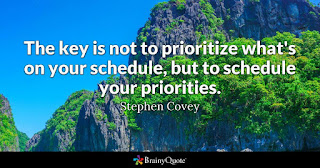Sometimes we feel that there are not
enough hours in the day to get everything done that is on our “to-do”
list. There may be occasions when we are
adding more things to the list and we are taking off. Or we’re adding them faster than we’re able
to get them done!
Maybe one of our problems is that we need
to get our list of things to do must be put into the proper order: prioritize!
What does this really mean for us to make some sense of our duties?
From the Oxford Dictionary: Prioritize means “determine the order for
dealing with (a series of items or tasks) according to their relative
importance.” That’s a lot of words but
in common sense thinking it means that we must determine which items need to
done first! Which have a greater
importance within our lives in relationship to the other things that we have to
do?
To give a very simple example: Today we have to eat our meals and we have to
go to town to buy a newspaper. I think
we can see which of these two items would be more important for us to get
accomplished. Obviously eating would take
priority over getting a news paper.
It is also obvious that our lives are much
more involved and complicated than the two simple tasks that I listed in the
paragraph above. So how do we get our “to-do”
list in the proper order?
According to a post in The Liquidplanner
Blog by Tatyana Sussex (April 8, 2014) (https://www.liquidplanner.com/blog/how-to-prioritize-work-when-everythings-1/),
although these apply primarily to the business section you can use these steps principals
in your everyday life. Here are six
steps that you should take:
1. Collect a list of all your tasks.
Pull together everything you could possibly consider getting done in a
day. Don’t worry about the order, or the number of items up front.
2. Identify urgent vs. important.
The next step is to see if you have any tasks that need immediate
attention. We’re talking about work that, if not completed by the end of the
day or in the next several hours, will have serious negative consequences
(missed client deadline; missed publication or release deadlines, etc.). Check
to see if there are any high-price dependencies that rely on you finishing up a
piece of work now.
3. Assess value.
Next, look at your important work and identify what carries the highest
value to your business and organization. As a general practice, you want to
recognize exactly which types of tasks have top priority over the others.
For example, focus on: client projects before internal work; setting up
the new CEO’s computer before re-configuring the database; answering support
tickets before writing training materials, and so on. Another way to assess
value is to look at how many people are impacted by your work. In general, the
more people involved or impacted, the higher the stakes.
4. Order tasks by estimated effort.
If you have tasks that seem to tie for priority standing, check their estimates,
and start on whichever one you think will take the most effort to complete.
Productivity experts suggest the tactic of starting the lengthier task first.
But, if you feel like you can’t focus on your meatier projects before you
finish up the shorter task, then go with your gut and do that. It can be
motivating to check a small task off the list before diving into deeper waters.
5. Be flexible and adaptable.
Uncertainty and change is a given.
Know that your priorities will change, and often when you least expect
them to. But—and here’s the trick—you also want to stay focused on the
tasks you’re committed to completing.
6. Know when to cut.
You probably can’t get to everything on your list. After you prioritize
your tasks and look at your estimates, cut the remaining tasks from your
list, and focus on the priorities that you know you must and can complete for
the day. Then take a deep breathe, dive in and be ready for anything.
If you can get into the habit of following
these simple steps you will find that your everyday tasks will become easier
for you to manage.
QUOTE TO CONSIDER
THOUGHTFUL GEM
"You'll always have your priorities right
when you learn what is truly important!"

No comments:
Post a Comment